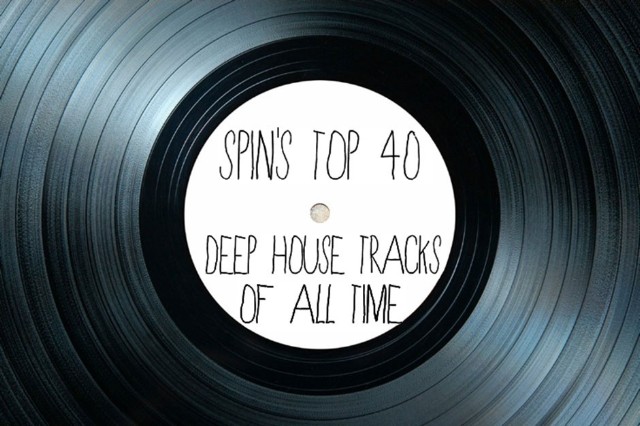Dream 2 Science, “My Love Turns to Liquid” (Power Move, 1990)
With its DIY-label typeface and private-press stats, this underground favorite had the one-off vibe of countless opportunistic house records that popped up in the wake of C+C Music Factory’s massive early-‘90s success. But its slinky, ultra-steamy sound — ingeniously shaped around an amplified sample of a dripping faucet — was clearly the work of someone who knew his way around a studio. That’d be Ben Cenac, who in the previous year had dipped his toe in the garage-house pool via Sha-Lor’s similarly sultry “I’m in Love,” but had blown-up big time via Newcleus, the pioneering ‘80s electro act most famous for Chipmunk-style rapping on the hits “Jam on Revenge (The Wikki Wikki Song)” and “Jam on It.” “My Love Turns to Liquid,” however, is as serious as those hip-hop classics are silly: It’s so laid-back that it makes you hype. BARRY WALTERS
Bobby Konders, “The Poem” (Nu Groove, 1990)

Also Read
The 30 Best Britney Spears Songs
Deep house and dub reggae rarely mix, so it’s fitting that one of their first and most enduring fusions came from Bobby Konders, a Brooklyn producer and DJ who would go on to be one of New York’s most important reggae selectors. (A host of the Best of the Best festival and a staple of Hot 97’s On Da Reggae Tip concerts, Konders and his partner Jabba helm weekend late-night slots on Hot 97.) Even as an instrumental, “The Poem” would have been a classic: It’s got one of the most irresistible bass lines in the house canon, and its jazzy flute-synth soloing sustains its dreamy, meditative mood. Dry snares and subtle bass distortion add grit to textures as smooth as crushed velvet, as does an extended introduction sampled from Mutabaruka’s “Dis Poem.” Beginning with a lament for the victims of the Middle Passage and an invocation of names — Marcus Garvey, Malcom X, Halie Selassie — Mutabaruka’s song of struggle gradually turns upon itself:Dis poem is no secret Dis poem shall be called boring stupid senseless
Dis poem is watchin u tryin to make sense from dis poem
Dis poem is messin up your brains
Making u want to stop listenin to dis poem
But u shall not stop listenin to dis poem
U need to know what shall be said next in dis poem
Dis poem shall disappoint u
Because
Dis poem is to be continued in your mind in your mind
In your mind in your mind
As Mutabaruka’s voice fades out in a wisp of dub delay, church organs rise in the mix, and that bass line begins its curious up-and-down jig. It’s a perfect mirror of the beatific ambivalence of the poem itself. P.S.
N.Y. House’n Authority, “Apt. 3A” (Nu Groove, 1989)
New York’s Nu Groove was, for a time, virtually synonymous with the twin brothers Rheji and Ronald Burrell. Label founders Karen Kahn and Frank Mendez discovered the pair the truly old-school way: while shopping in a record store and overhearing their demos playing out of a boombox that the brothers’ studio partner Tim D. happened to be lugging around. After the Burrells’ contract making R&B for Virgin went south, Kahn and Mendez launched Nu Groove in 1988 as an outlet for their work. As that catalog ballooned — they put out 100 records in just their first three years — Nu Groove would also release records by Frankie Bones and Lenny Dee, Masters at Work, and Bobby Konders, but Rheji and Ronald represented the core of the label’s roster. Favoring low-key profiles and a prodigious release schedule, the twins recorded under a slew of aliases, sometimes together but mostly separately, taking turns in the haphazard studio they had set up in their mother’s basement in New Jersey. Ronald recorded as Aphrodisiac, Equation, KATO, and others; Rheji’s aliases included Assylum, Dance Lessons, Metro, Roqui, and N.Y. House’n Authority. In the liner notes to Burrell Brothers Present New York Underground: The Nu Groove Years, Rheji told Bill Coleman, “Our love of dancing — I’m talking expressive, acrobatic, seductive, fun, crazy dancing — inspired us to make raw, greasy, poorly recorded underground tracks that we liked to move to at 4 or 5 in the morning.” And that’s exactly what his “APT. 3A” sounds like. Crisply stepping drums hiss dry-ice tendrils. Bass, chords, and a synth-clarinet melody twine together in graceful counterpoint, while pitch-bent fillips mimic dancers pirouetting across a hardwood floor in stocking feet. It’s profoundly stripped down, even for the standards of the day, but it’s also expressive as hell. The six tracks on Rheji’s first EP as N.Y. House’n Authority bear apartment numbers in place of titles — an urban metaphor for the music’s careful balance of intimacy and anonymity. P.S.
Ananda Project, “Cascades of Colour” (Nite Grooves, 1998)
Atlanta-born producer-remixer Chris Brann had a Parliament/Funkadelic interchangeable-identity thing going on with his Wamdue Project and Ananda Project, which briefly even shared the same poised vocalist, Gaelle Addison. In 1997, the former entity scored a U.K. No. 1 pop hit with “King of My Castle”; the next year, the latter released this far more meditative sequel. Addison testifies with unquestionable poise that life is illusory, but a guiding light emerges as descending jazz chords tumble and synthetic birds chirp. Joe Claussell, Ben Watt, and Danny Tenaglia all had their way with this track, but Brann’s original Wamdue Black mix remains the most savory. B.W.
Storm Queen, “Look Right Through” (Environ, 2010)
https://youtube.com/watch?v=IGpAf5VDO3Q
New Jersey-born, Queens-based Morgan Geist makes connoisseur’s dance music. Both on his own and as half of Metro Area, his work is filled with nuance as well as nerd-tastic allusions to yesteryear’s cosmopolitan joints: Generic glow-stick grooves, they are most certainly not. So it’s kind of amazing (and a major sign of the times) that this three-year-old house track, which is a bit catchier but otherwise differs little from his disco-derived output, became a slow-burning club staple and, on its third release, a U.K. No. 1 pop hit this month. Vocalist Damon C. Scott gives a vocal performance dripping with Daptone-variety vintage R&B, and the lyric is downhearted; it speaks of being seen, but not comprehended or appreciated. Yet there’s playfulness in the percolating synths and percussion, a resiliency played out by the song’s belated success. Mark “MK” Kinchen’s remix, the hit version, strips the track, highlights the vocal, and cuts it up in the sample-happy early-‘90s style once again in vogue. Subtle it no longer is, but deep it remains. P.S
Gunnar Wendel, “578 (Omar S. Rude Boy Warm Mix)” (FXHE, 2010)
Kassem Mosse and the Workshop label have been responsible for some of the slowest, murkiest, and most mysterious house music of the last several years — their records are spongy and lysergic, like magic mushrooms sprouting from piles of mouldering reel-to-reel tapes in a dank Midwestern basement. “578,” originally released on the tiny Mikrodisko label in 2008, offers a spot-on approximation of the EP’s title, Aqueous Haze (The World Disappeared into An), with its swirling chords and ocean-floor clicks and slow, tidal grumbling. There are all of three chords, two bass notes, and a single drum pattern, but the dub delay extrapolates nearly unfathomable dimensions from its meager materials.In 2010, Detroit’s Omar-S made two remixes of the track for his own FXHE label (which he released, for whatever reason, under Kassem Mosse’s real name, Gunnar Wendel). More than remixes, they’re edits, really; the “Berlin Mix” mutes some of the midrange, while the “Rude Boy Warm Mix” slows the tempo a good 15 percent and strips it all down to nothing but skeletal drums, surly ostinato bass, and sleek leads that glide like manta rays. All three versions are great, but it’s the “Rude Boy Warm Mix” that captures the essence of the thing — a lithe, liquid dance between light and shadow. P.S.
Robert Owens, “I’ll Be Your Friend” (RCA, 1991)
Chicago-based frontman for Larry Heard’s Fingers Inc., guest vocalist for Photek and Frankie Knuckles/Satoshi Tomiie, and singer of many solo joints, Robert Owens is the voice of deep house the way Donna Summer embodied disco: His groans, moans, and excitations make a meeting place between gospel and underground clubland’s collective sensuality. Nearly all of his greatest jams — “Mystery of Love,” “Bring Down the Walls,” “Tears,” “Mine to Give,” and this 1991 classic — build memorable songs out of little more than vamps. Like on those other records, he fills the spaces over bass, beats, and richly atmospheric keys with insistent incantations of the title. Producer David Morales — one of the few DJs to adroitly bridge the deep house/pop-remixer divide — cloaks his cries in reverb as synth horns honk and dub-drenched rhythms reverberate. His message is uplifting, but the mood is dusky, ominous. The takeaway? Real friendship is heavy, yet godly. B.W.




